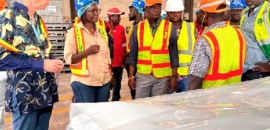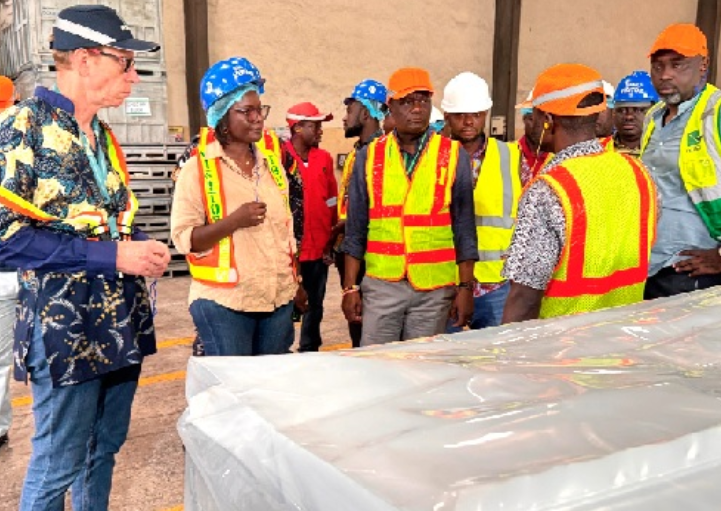
GREL Operations Under Attack
Sep 16, 2025
by Ekow Benyah Sep 16, 2025

September 15, 2025
Ghana’s quest to industrialise through value addition is under serious threat as the smuggling and unregulated export of raw rubber deprive local processors of essential feedstock. Industry players and government officials warn that the practice could derail job creation, weaken foreign exchange inflows, and undermine investments worth millions of cedis in the rubber sector.
Western Regional Minister, Joseph Nelson, has described the development as alarming, noting that Ghana has more than enough installed processing capacity to handle all raw rubber produced locally. He argued that exporting the commodity in its raw form denies the country of value-added benefits.
“It does not make sense to have sufficient mature raw rubber trees being tapped daily, yet processing facilities such as GREL are struggling to get enough raw material. If this continues, the 24-hour Economy mandate will be defeated in this part of the country,” Mr. Nelson told journalists after touring the Ghana Rubber Estates Limited (GREL) primary processing factory at Apemanim in the Ahanta West Municipality.
He blamed the situation on the influx of middlemen who buy tapped rubber directly from farmers at higher prices for export, starving domestic processors of inputs. The minister urged the Tree Crop Development Authority (TCDA) to intervene decisively, stressing that beyond setting benchmark prices, the Authority must curb distortions in the market.
“The time has come to halt raw rubber exports because Ghana clearly has the capacity to process all of it locally. Value addition is the future, and depending on external markets for raw material exports will only keep us trapped in underdevelopment,” he said.
The warning comes at a critical time for Ghana Rubber Estates Limited (GREL), the country’s largest processor in which the government holds a 26.75 percent stake. Despite massive investments including over GH¢840 million since 2018 for expansion and a new factory at Tsibu GREL is operating below capacity due to raw material shortages.
Managing Director Thierry Cauchy revealed that GREL has installed capacity to process 90,000 tonnes of raw rubber annually, with potential scalability to 140,000 tonnes through round-the-clock shifts. However, smuggling has left much of this capacity underutilized.
“In 2024, Ghana earned $98 million in foreign exchange from processed rubber exports, but the potential was $160 million. Unless we have full access to local raw material, earnings will drop further this year,” Mr. Cauchy said.
He explained that Ghana produces about 90,000 tonnes of rubber annually, more than 70,000 tonnes of which comes from outgrowers. If all of this output were processed locally, Ghana could not only meet international demand—supplying global tyre manufacturers such as Michelin, Bridgestone, Pirelli, and Apollo—but also create significant employment and expand its tax base.
The ripple effects of the smuggling menace extend far beyond GREL. Smaller processors that rely on local rubber also face shortages, threatening thousands of jobs and undermining the government’s industrialisation drive.
Mr. Nelson warned that if unchecked, the practice could erode investor confidence in Ghana’s agro-industrial sector. “We cannot invite investors to set up factories here only for them to operate at half capacity because raw material is being siphoned out unprocessed,” he said.
Economists argue that rubber is now joining cocoa, gold, bauxite, and manganese as examples of Ghana’s overdependence on raw commodity exports. Without value addition, the country loses not just foreign exchange but also the multiplier benefits of industrialisation ranging from downstream industries to logistics and technology transfer.
Both government officials and industry leaders are calling for urgent policy interventions. Key among these are:
Stricter regulation of raw rubber exports to ensure all locally produced rubber is processed domestically.
Enhanced monitoring and enforcement by TCDA to curtail the activities of middlemen.
Capital injection and incentives for processors like GREL to expand operations and absorb more outgrower production.
Farmer engagement and fair pricing mechanisms to prevent smuggling through informal markets.
Mr. Cauchy emphasized that sustained collaboration between government, TCDA, and processors is vital. “Our business starts from the nursery, growing plants, and finishes at the port, where we export to international markets. But without raw material, the chain collapses. Ghana must secure its processing industry if it wants to maximise foreign exchange and jobs,” he said.
With global demand for rubber expected to rise due to growth in the automotive and manufacturing industries, Ghana risks missing out on a lucrative opportunity if smuggling is not curbed. Experts warn that continuing to export raw rubber undermines the country’s Ghana Beyond Aid vision and weakens its push for industrial-led development.
The challenge now rests with policymakers to protect domestic processors and ensure that Ghana’s rubber sector evolves from raw material dependence to a value-added powerhouse.

Sep 16, 2025

Jan 16, 2026

Apr 12, 2025

Sep 26, 2025

Jan 26, 2026

Sep 29, 2025

Sep 16, 2025